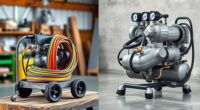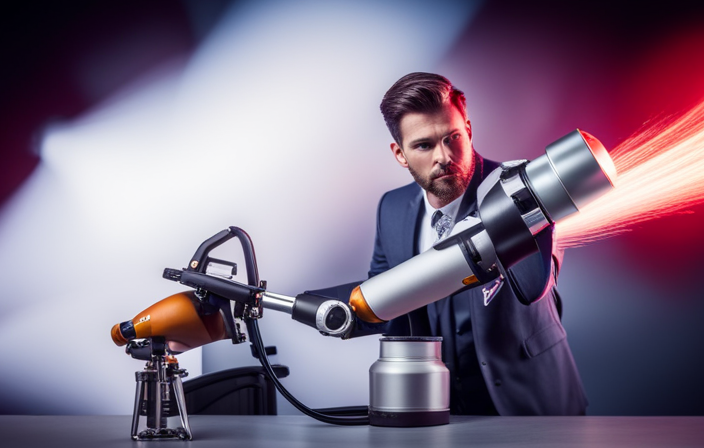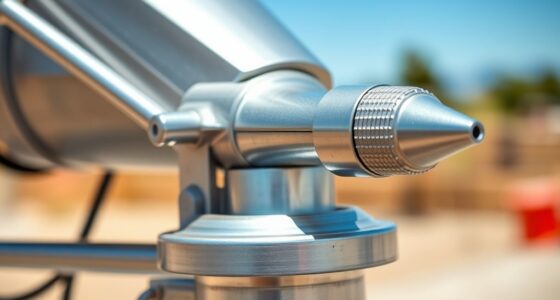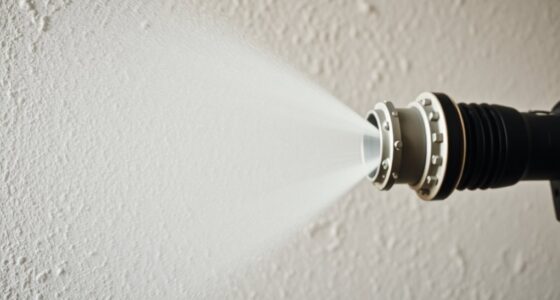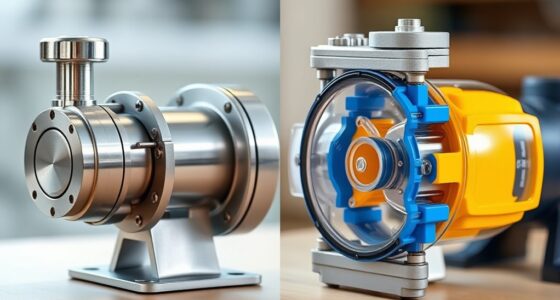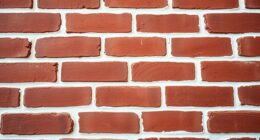A professional sprayer needs a durable build with high-quality materials to withstand frequent use and tough environments. It should have ample capacity to cover large areas efficiently and features like adjustable pressure and versatile nozzles for precise application. Easy-to-use controls, ergonomic design, and straightforward maintenance are essential for long-term performance. Safety features and compliance guarantee reliable operation. To discover how these elements come together for top results, keep exploring what’s involved.
Key Takeaways
- Durable, high-quality construction with corrosion and UV resistance ensures longevity under demanding conditions.
- Large capacity tanks and chemical compatibility support efficient, extensive application without frequent refills.
- Precise pressure control and reliable pump mechanisms guarantee consistent spray patterns and professional finishes.
- Ergonomic design with easy maintenance features promotes prolonged, comfortable use in professional settings.
- Safety features and industry certifications ensure compliance, reliability, and safe operation during intensive tasks.
Durability and Build Quality
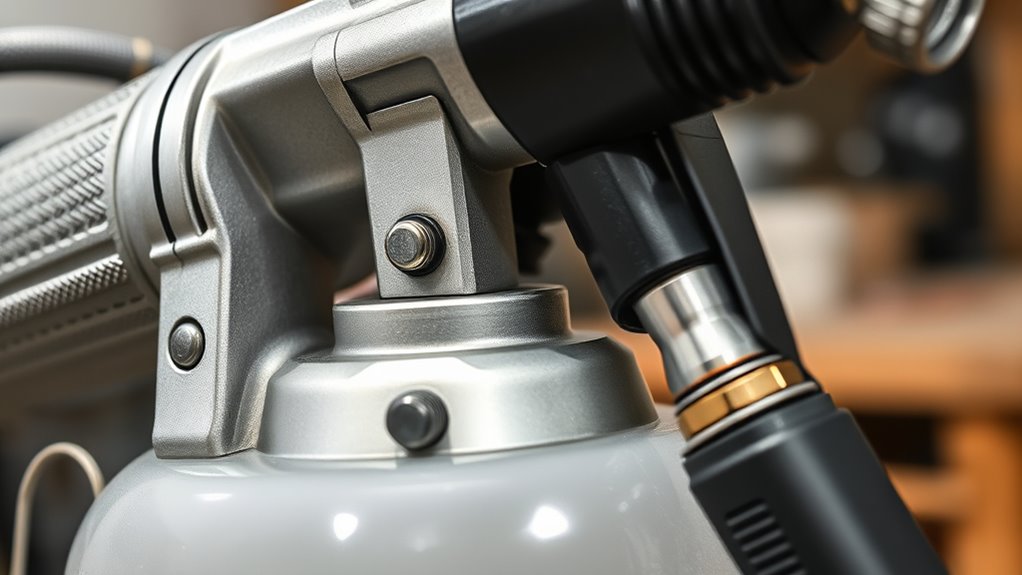
When choosing a professional sprayer, durability and build quality are essential factors that guarantee your investment lasts under demanding conditions. The hose material plays a critical role in ensuring longevity; high-quality hoses made from reinforced rubber or polyethylene resist cracks, kinks, and chemical damage. A sturdy build with reinforced fittings and a solid pump also contributes to reliability. Additionally, warranty coverage reflects the manufacturer’s confidence in their product’s durability. Look for sprayers offering extensive warranties that cover parts and repairs, giving you peace of mind during intensive use. Investing in a sprayer with robust construction and reliable hoses means fewer replacements and repairs, ultimately saving you time and money while maintaining consistent performance. Moreover, selecting a model with best build quality ensures it can withstand frequent use and challenging environments typical in professional settings. A corrosion-resistant design further enhances longevity, especially when working with harsh chemicals or outdoor conditions. Ensuring that the materials used are UV resistant can also help prevent deterioration when exposed to sunlight over time. Incorporating proper maintenance practices can extend the lifespan of your equipment significantly.
Capacity and Coverage Area
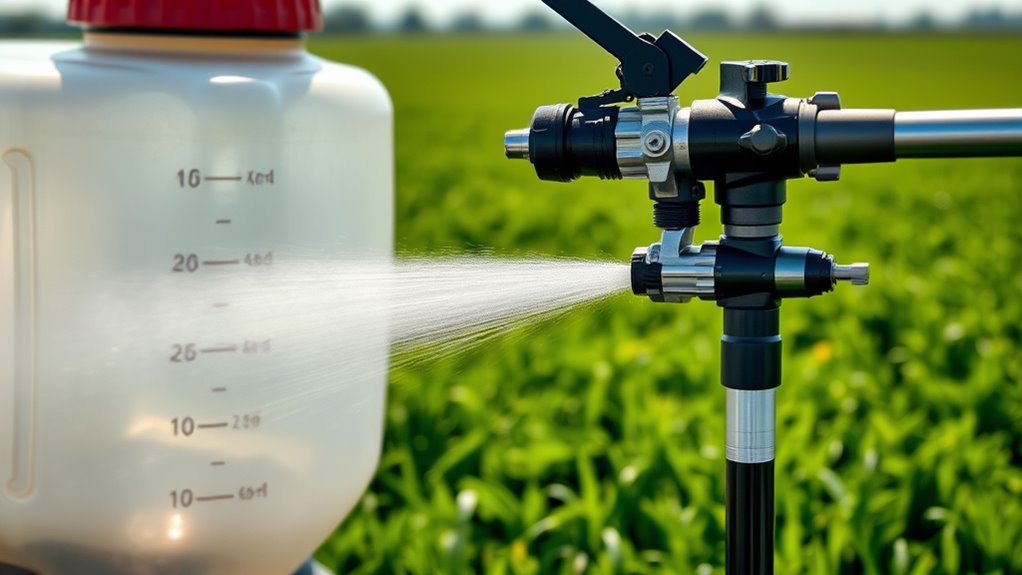
A professional sprayer’s capacity and coverage area directly impact your efficiency and productivity. Larger tanks allow you to cover more ground without frequent refills, saving time during large projects. Guarantee the sprayer’s capacity aligns with your workload to prevent interruptions. Chemical compatibility is essential; check that the sprayer’s materials suit the chemicals you use to avoid damage or contamination. Battery life also plays a significant role—longer battery life means you can work longer without recharging, maintaining consistent performance. A sprayer with an ideal capacity and coverage area tailored to your needs helps streamline your workflow. Consider both chemical compatibility and regular maintenance to choose a sprayer that keeps you productive throughout your tasks. Resources and Tools can offer additional guidance on selecting the right equipment for your professional needs.
Pump Type and Pressure Control
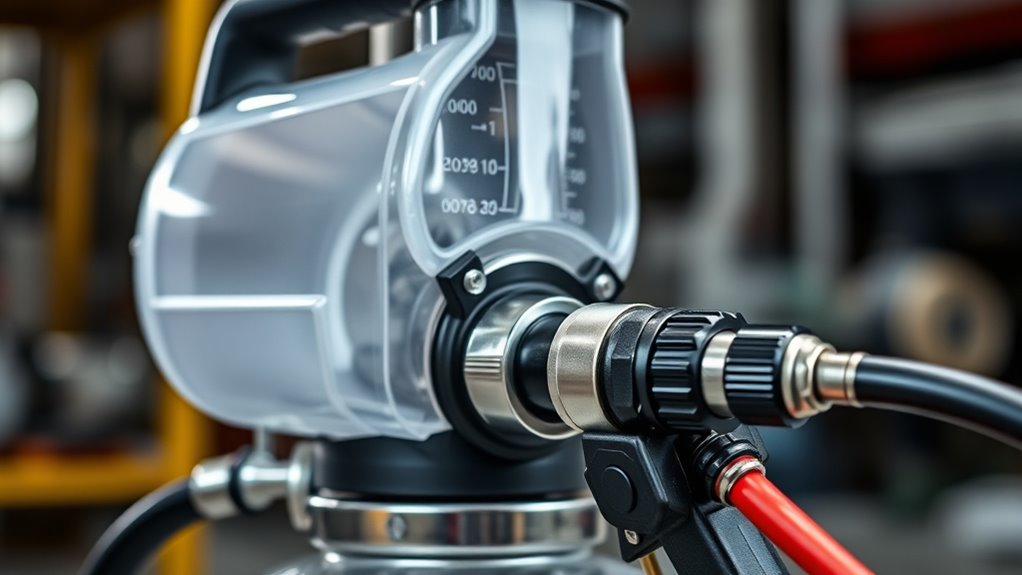
Choosing the right pump type directly impacts your sprayer’s efficiency and performance. Adjustable pressure features let you customize the spray for different tasks, ensuring ideal results. Consistent spray delivery helps you apply materials evenly, saving time and reducing waste. Additionally, understanding the pressure control mechanisms can help optimize operation and prevent equipment damage. For example, selecting a pump compatible with performance upgrades can further enhance your sprayer’s capabilities and longevity. Proper maintenance and understanding of sprayer pressure settings are also crucial for achieving professional-quality finishes and maintaining equipment durability.
Pump Mechanism Efficiency
The effectiveness of a sprayer’s pump mechanism directly impacts its overall performance, making it essential to select the right pump type and pressure control system. A reliable pump ensures consistent pressure, which directly affects the spray pattern and coverage. When considering pump mechanism efficiency, focus on how well the pump maintains steady pressure during prolonged use. This consistency influences nozzle selection, as certain nozzles require specific pressure ranges to produce an even spray pattern. A high-efficiency pump minimizes pressure fluctuations, resulting in a uniform application and reduced material waste. Choosing a pump with ideal efficiency helps you achieve precise, professional results, regardless of the spraying task. Additionally, understanding AI-driven diagnostics techniques can help optimize equipment performance for specialized applications. Ensuring that the pump system is compatible with the refrigerants and environmental standards can also contribute to overall efficiency and sustainability. Ultimately, a well-functioning pump mechanism ensures your sprayer operates smoothly and delivers the desired spray pattern every time.
Adjustable Pressure Features
Adjustable pressure features, including pump type and pressure control mechanisms, play a vital role in customizing your sprayer’s performance to suit specific applications. With the right pressure control, you can fine-tune the spray pressure for different tasks, guaranteeing optimal coverage and efficiency. Your choice of sprayer nozzle impacts how pressure affects the spray pattern; higher pressure can create a finer mist, while lower pressure produces a broader spray. Many professional sprayers include adjustable pressure regulators, allowing you to easily modify the pressure based on the material and surface. This flexibility ensures you achieve precise application, whether you’re applying pesticides, fertilizers, or coatings. The ability to precisely control pressure is especially important when working with sensitive or variable surfaces, as it helps prevent over-application or waste. Additionally, pressure regulation can help reduce material waste and minimize environmental impact by allowing more accurate dosages. Proper pressure management can also extend the lifespan of your equipment by reducing stress on components. Incorporating advanced pressure control features can further enhance the sprayer’s adaptability to complex or demanding tasks. Ultimately, adjustable pressure features enable you to adapt your sprayer to various needs, enhancing both effectiveness and productivity. Retail hours and availability of related products can also influence your choice of sprayer for professional use.
Consistent Spray Delivery
To guarantee your sprayer delivers a steady, uniform spray, selecting the right pump type and pressure control system is vital. A consistent pressure ensures the spray pattern remains even, preventing drips or gaps that compromise application quality. Proper nozzle selection is essential, as different nozzles produce specific spray patterns suitable for various tasks. Adjustable pressure controls allow you to fine-tune the flow, maintaining uniform delivery regardless of the tank’s level. By choosing a pump with reliable pressure regulation, you ensure your spray pattern stays consistent, improving coverage and efficiency. Incorporating modern technology can further enhance the precision and reliability of your sprayer. Additionally, understanding Volkswagen Tuning techniques can inspire innovative modifications to optimize equipment performance. This combination reduces uneven application, saves materials, and enhances results, making your sprayer truly suitable for professional use.
Compatibility With Various Solutions
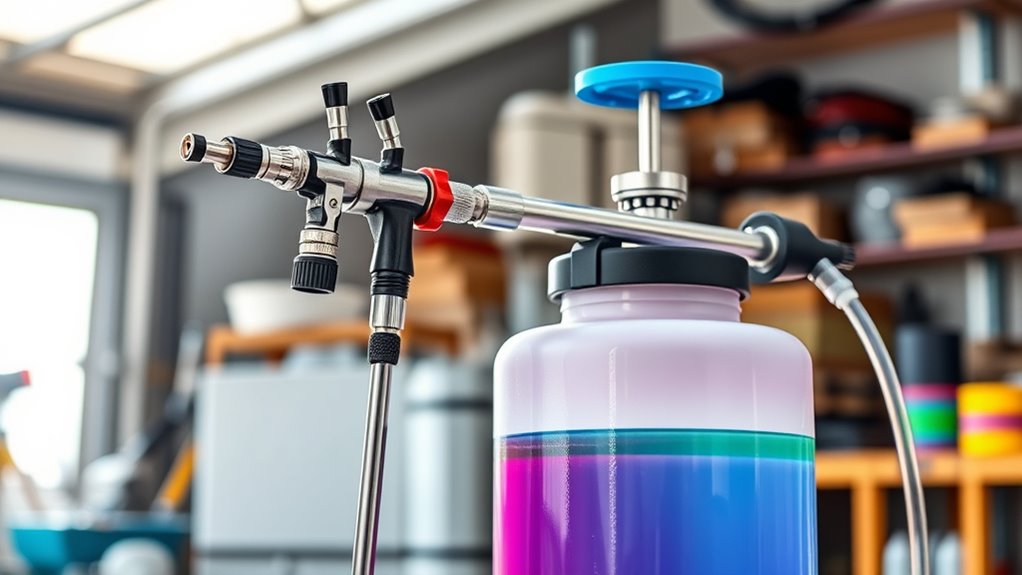
Ensuring your professional sprayer can handle a variety of solutions is essential for effective application. You need to contemplate solution viscosity, as thicker liquids require equipment that can manage higher resistance without clogging or losing pressure. A sprayer with adjustable pressure settings helps accommodate different viscosities. Nozzle compatibility is equally important; different solutions may need specialized nozzles to prevent clogging or ensure even coverage. Check if your sprayer supports interchangeable nozzles designed for various solutions. Using incompatible nozzles or attempting to spray liquids outside the recommended viscosity range can lead to inefficient coverage, equipment damage, or downtime. Select a sprayer engineered for versatility, ensuring it can handle a broad spectrum of solutions for professional, reliable results. Proper consideration of air purifier features can also contribute to maintaining a clean and safe environment during application. Additionally, paying attention to solution compatibility ensures the sprayer operates efficiently without damage or contamination, and understanding solution viscosity helps prevent operational issues.
Ergonomics and Ease of Use
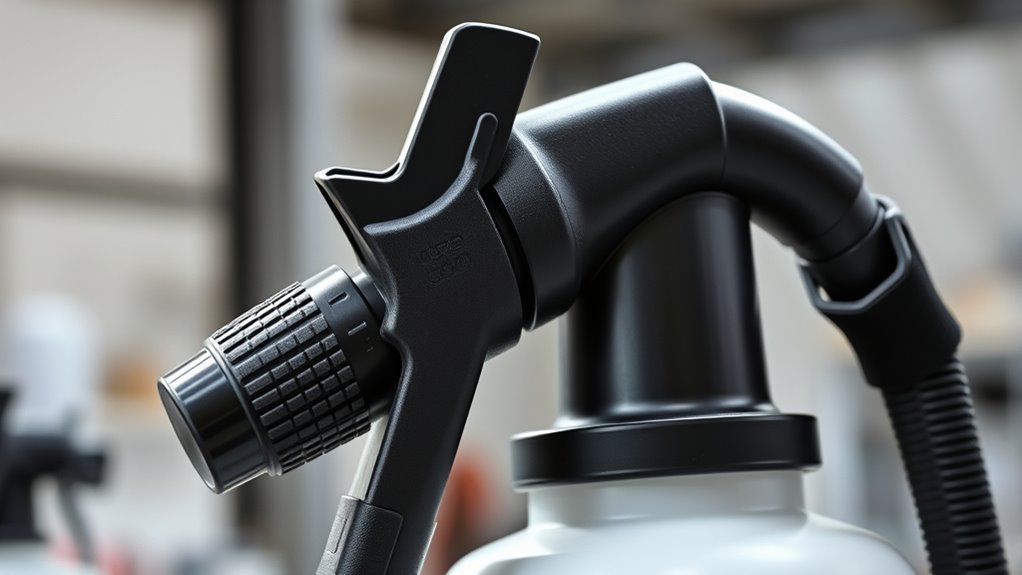
A sprayer’s design should prioritize user comfort and simplicity to maximize efficiency during extended use. An ergonomic design ensures that you can operate the sprayer with minimal strain, reducing fatigue during long spraying sessions. Look for features like a comfortable grip, lightweight construction, and balanced weight distribution to enhance user comfort. Easy-to-use controls and intuitive functionality allow you to focus on the task without unnecessary hesitation or complication. A well-designed sprayer minimizes repetitive motions and awkward postures, helping prevent fatigue and injury. When a sprayer is ergonomic and simple to operate, it boosts your productivity, reduces downtime, and makes professional spraying tasks more manageable and less physically demanding. Ultimately, good ergonomics support your efficiency and well-being on the job.
Maintenance and Serviceability
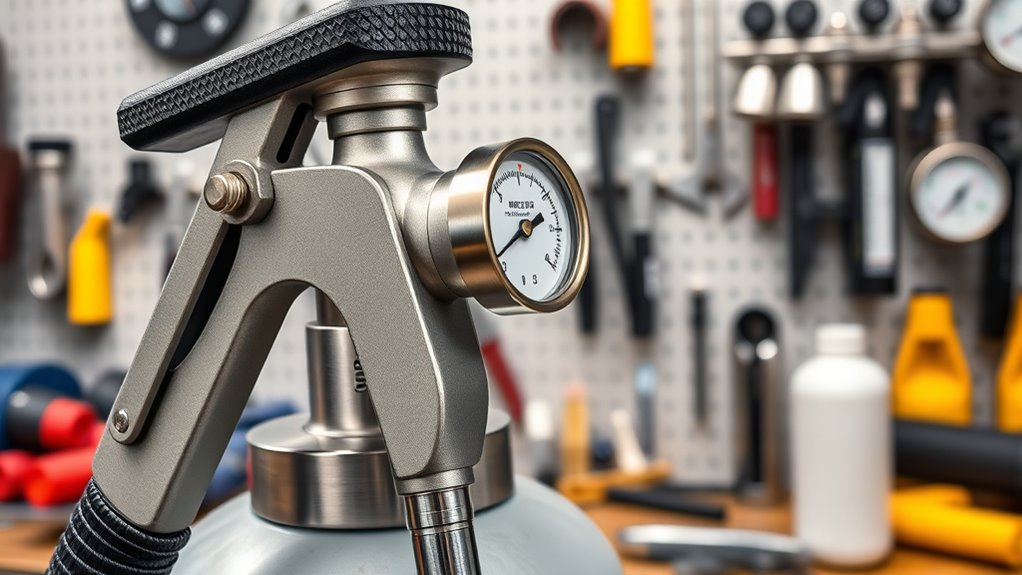
Regular maintenance and easy serviceability are crucial for keeping your sprayer operating efficiently and avoiding costly downtime. By routinely performing filter maintenance and promptly replacing nozzles, you guarantee optimal performance and reduce breakdown risks. Look for sprayers designed with accessible parts and straightforward disassembly to streamline service tasks. Proper filter maintenance prevents clogs, while easy nozzle replacement maintains spray quality. The table below highlights key features that enhance serviceability:
| Feature | Benefit | Example |
|---|---|---|
| Quick-access panels | Simplifies filter checks | Front-mounted filters |
| Modular components | Eases part replacement | Detachable nozzles |
| Clear instructions | Reduces repair time | User-friendly manuals |
| Durable design | Minimizes wear and tear | Reinforced connection points |
Safety Features and Regulations Compliance
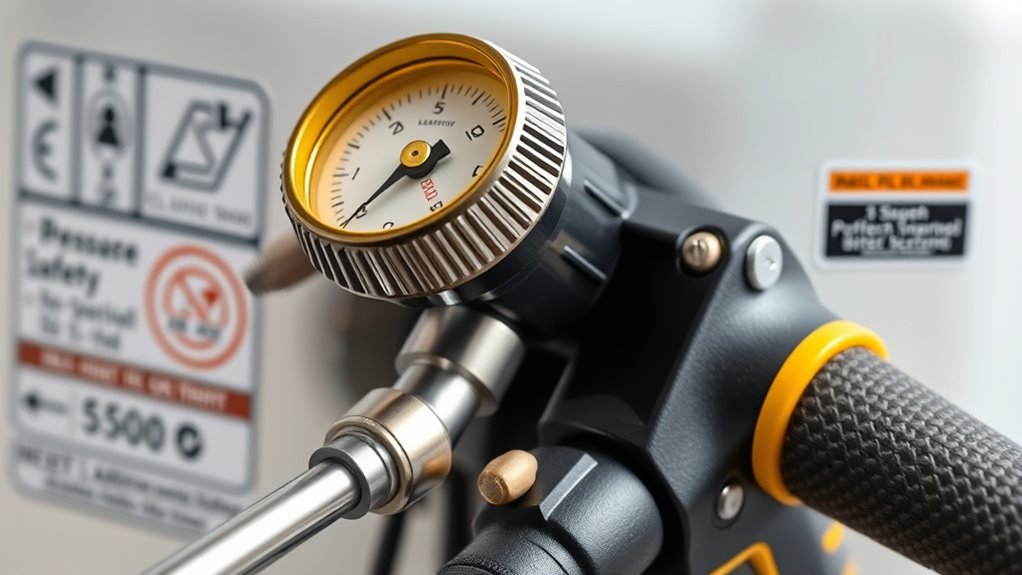
Maintaining your sprayer’s peak performance also means prioritizing safety features and guaranteeing compliance with relevant regulations. Safety standards set by industry authorities help protect you from potential hazards, such as leaks, spills, or accidental exposure. Look for sprayers equipped with safety valves, ergonomic design, and secure locking mechanisms to minimize risks during operation. Regulatory compliance ensures your equipment meets legal requirements, preventing fines and ensuring safe working conditions. Always check that your sprayer adheres to local safety standards and has proper certification. Incorporating these features not only keeps you safe but also enhances your credibility as a professional. Prioritizing safety features and regulatory compliance is essential for reliable, efficient, and safe spraying operations.
Frequently Asked Questions
What Is the Typical Lifespan of a Professional Sprayer?
The typical lifespan of a professional sprayer varies, but with proper maintenance schedules, you can expect it to last between 3 to 5 years. Regular upkeep reduces wear and tear, while focusing on user ergonomics guarantees comfortable handling, prolonging its use. By adhering to manufacturer guidelines and addressing repairs promptly, you maximize your sprayer’s durability, making it a valuable investment for your professional needs.
How Does Temperature Affect Sprayer Performance?
Imagine a clear day turning stormy; temperature swings challenge your sprayer’s performance. You notice inconsistencies in spray patterns and chemical delivery. Temperature stability directly impacts how well your sprayer functions, especially with chemical compatibility. Extreme heat or cold can cause parts to expand, contract, or clog, reducing efficiency. To keep your work flawless, choose a sprayer designed for stability across temperature ranges, ensuring reliable, consistent results every time.
Are Replacement Parts Readily Available for Major Brands?
You’ll find that spare part availability varies among major brands, impacting your ability to quickly repair or upgrade your sprayer. Reputable brands typically offer robust brand support, ensuring you can access essential spare parts when needed. This availability makes maintenance easier and reduces downtime, especially important for professional use. Choosing a brand with readily available spare parts and strong support helps keep your sprayer in ideal condition, ensuring continuous performance.
Can the Sprayer Handle Abrasive or Corrosive Chemicals?
You should check the sprayer’s chemical compatibility before using it with abrasive or corrosive chemicals. Look for models made from durable materials like stainless steel or specialized plastics, which resist corrosion and wear. This guarantees material durability and safe handling. A sprayer designed for such chemicals prevents damage, leaks, or failure, keeping your work efficient and safe. Always verify the manufacturer’s specifications for chemical compatibility to ensure maximum performance.
What Warranty Options Are Usually Offered With Professional Sprayers?
Warranty options for professional sprayers act like a safety net, catching potential issues early. You should look for extensive warranty coverage that includes parts and labor, along with reliable service support to keep your equipment running smoothly. Many manufacturers offer extended warranties or on-site repairs, giving you peace of mind. Always check the fine print to ensure the coverage matches your demanding professional needs, so you stay productive without interruptions.
Conclusion
Choosing a professional sprayer means prioritizing durability, capacity, and precise control. Did you know that a high-quality sprayer can cover up to 10,000 square feet in just an hour? By selecting a model with robust build, adjustable pressure, and easy maintenance, you’ll boost efficiency and safety. Remember, investing in the right sprayer not only saves time but guarantees consistent, reliable results—making your work both easier and more effective every time.

